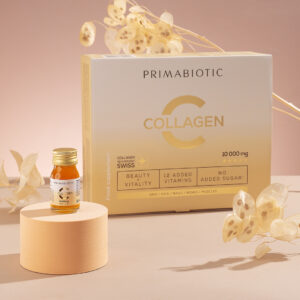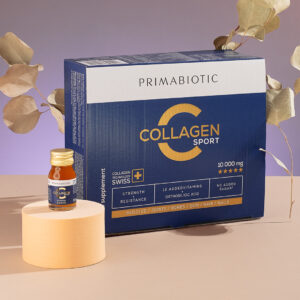
How to Restore Collagen in the Face: Best Ways to Boost Collagen Production
Collagen is a structural protein responsible for maintaining the firmness, elasticity, and healthy appearance of the skin. With age, its levels decline, leading to wrinkles and loss of resilience. Many people wonder how to stimulate collagen production in the face and throughout the body, as well as how to naturally and safely replenish collagen in the skin. The answer lies in diet, supplementation, and lifestyle – these are the key factors that determine how to support collagen production in the body.
Why Do We Lose Collagen with Age?
As we age, the body produces fewer enzymes necessary for proper collagen processing, and the number of fibroblasts responsible for its synthesis decreases. In addition, blood vessels in the skin become thinner and less abundant, which reduces circulation and the supply of nutrients and oxygen to skin cells. As a result, collagen production in the body slows down, skin loses elasticity, and wrinkles appear. This leads to dehydration, loss of firmness, and gradual thinning of the epidermis. That’s why it’s important to know how to replenish collagen in the skin and how to support collagen production in the body through diet, supplementation, and a healthy lifestyle.
According to research published in the Journal of Cosmetic Dermatology, after the age of 25, we lose around 1% of collagen each year. External factors also contribute to this process: UV radiation, oxidative stress, smoking, and a diet low in antioxidants. This is why it is crucial to understand what stimulates collagen production and how to act preventively.
How to Increase Collagen in the Body Through Diet
A well-balanced diet can effectively support collagen production, protect collagen fibres from degradation, and help maintain healthy, firm skin. A diet rich in essential vitamins, minerals, and amino acids is one of the simplest ways to replenish collagen in the body and support its natural regeneration.
Key Nutrients for Collagen Production
- Protein – provides essential amino acids (glycine, proline, lysine) that are the building blocks of collagen and crucial for its production.
- Amino acids (glycine, proline, lysine) – support collagen synthesis and skin regeneration.
- Vitamin C – a key cofactor of collagen-forming enzymes, essential for replenishing collagen in the skin.
- Zinc and copper – cofactors of enzymes that support collagen synthesis and cross-linking of collagen fibres.
- Antioxidants (polyphenols, carotenoids) – protect collagen fibres from oxidative stress.
- Water – essential for skin hydration and optimal fibroblast function, supporting natural collagen regeneration.
Foods That Support Collagen Synthesis
To effectively support collagen production in the body, it’s worth including a variety of foods rich in protein, vitamin C, zinc, copper, and antioxidants:
- Additional collagen sources: bone broth, jelly, meat stock, fish with skin
- Water: for proper hydration and fibroblast support
- Citrus fruits, kiwi, peppers, strawberries, blackcurrants – rich in vitamin C
- Pumpkin seeds, cashews, Brazil nuts, and sunflower seeds – sources of zinc and copper
- Chicken, broth, gelatine, fish with skin, eggs – high-quality protein and essential amino acids
- Green tea, berries, dark grapes, red cabbage, cocoa – polyphenols, and antioxidants that protect collagen fibres
Supplements Supporting Collagen Production and Restoration
Various nutrients and supplements are used to improve skin health and maintain a youthful appearance. These include:
- Liquid collagen – supports the rebuilding of collagen fibres and production in the body
- Vitamin C – essential for collagen synthesis and protection against oxidative stress
- Hyaluronic acid – supports skin hydration and firmness
- Plant extracts rich in antioxidants – e.g. green tea, grapes
- Vitamin E – protects collagen against oxidative stress
- Zinc and copper – support enzymes needed for collagen synthesis
- L-proline and L-glycine – amino acids specifically supporting collagen production
- Ceramides and coenzyme Q10 – support skin hydration and fibre protection
- Protein supplements – rich in amino acids
How to Boost Collagen Production in Skin
There are many ways to naturally stimulate collagen production in the skin and regenerate collagen fibres. Modern cosmetology offers treatments such as laser therapy, microneedling, or radiofrequency, which activate fibroblasts and support collagen rebuilding. In daily skincare, it is worth using creams and serums with retinol or peptides, which aid skin repair processes and stimulate collagen production.
Additionally, oral collagen supplements can support the body’s natural collagen production and help rebuild collagen in the skin, which is particularly useful for those looking for ways to replenish collagen in the face.
How to Restore Collagen in the Face?
If you’re wondering how to stimulate collagen in the face, it’s worth combining diet, supplementation, and skincare. This approach allows both internal activation of fibroblasts and external protection of the skin. A proper skincare routine combined with a protein- and antioxidant-rich diet is the key to success.
How to Boost Collagen Production in the Joints?
To support collagen production in the joints, it is worth taking supplements containing bovine collagen, vitamin C, and hyaluronic acid. Moderate physical activity is also essential. Regular exercise supports cartilage metabolism, stimulates fibroblast regeneration, and improves joint flexibility. A healthy diet and supplementation further aid collagen regeneration, which not only supports joint function but also overall mobility.
Lifestyle Habits Supporting Collagen Production
In addition to diet and supplementation, everyday habits play a huge role. Lifestyle largely determines how long the skin will remain firm and healthy. Hydration, physical activity, recovery, and protection against harmful external factors significantly support the body’s natural collagen production.
- Regular hydration – about 2 litres of water daily supports fibroblasts and collagen regeneration
- Physical activity – at least 30 minutes of movement a day supports collagen metabolism, skin, and joint elasticity
- Sun protection – daily SPF protects collagen fibres from degradation
- Avoiding stimulants – smoking and excessive alcohol accelerate collagen loss
- Sleep and recovery – 7-9 hours of sleep per night support fibroblast repair processes
- Diet – regular, nutritious meals rich in protein, vitamin C, zinc, copper, and antioxidants support collagen production
The Best Ways to Boost and Rebuild Collagen
Here’s what stimulates collagen production:
- A diet rich in vitamin C, zinc, copper, antioxidants, and high-quality protein
- Collagen and vitamin C supplementation – an effective way to replenish collagen in the skin
- Skincare with retinol and peptides – a proven way to stimulate collagen production
- Cosmetic treatments that activate fibroblasts and collagen production
- A healthy lifestyle – hydration, sleep, UV protection, as natural methods to restore collagen
Check out the other articles:


